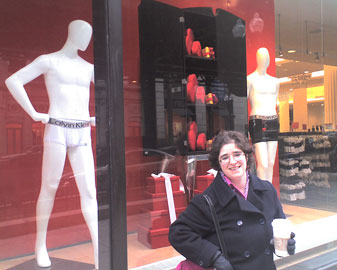Acclaimed British fashion designer Alexander McQueen was found dead in his home on Feb. 11, CNN reported. Later news stories confirmed that the 40-year-old designer had committed suicide by hanging.
I was deeply saddened by this news. It goes without saying that premature death is always terrible, especially by suicide, and especially when it seems to outsiders that the person had so much to live for–genius, success, and an appreciative community.
But McQueen was special to me in particular because his aesthetic matched my ideals as a writer. Through fashion, a medium that many dismiss as frivolous, he achieved that marriage of beauty, sensuality, horror, and the uncanny that philosophers of art have called the sublime.
The Associated Press writes:
…Known for his dramatic statement pieces and impeccable tailoring, McQueen dressed celebrities from Cameron Diaz to Lady Gaga and influenced a generation of designers.
The son of a cab driver, McQueen grew up on a public housing estate in London’s East End, left school at 16 and entered the fashion world the old-fashioned way, as a teenage apprentice to a Saville Row tailor. He later studied at Central St. Martin’s art college in London and was discovered by fashion guru Isabella Blow, who bought his entire graduation collection. She became a friend and mentor; her suicide three years ago shook the designer, who wept openly at her funeral.
McQueen was a private man who avoided the limelight, but his Twitter postings show emotional turmoil after his mother’s death on Feb. 2. McQueen had posted messages four days before his death about his “awful week,” and said he had to “somehow pull myself together and finish.”
His mother’s funeral was held the day after McQueen died.
Friends also said he might have felt under pressure to outdo himself at the unveiling of his spring collection in Paris next month.
“I don’t think success was easy for him,” friend Plum Sykes wrote in the Sunday Telegraph this week. “He told me he was driven by his insecurities, and he believed that all successful people were.”
McQueen became chief designer at the Givenchy house in 1996, but was best known for his own label, in which Gucci bought a majority stake in 2001. McQueen retained creative control, and became famous for his dramatic and often uncategorizable creations: sculptural cocktail dresses in psychedelic patterns; headwear made of trash; 10-inch (25 centimeter) heels shaped like lobster claws.
…
The GLBTQ website, an online encyclopedia of queer culture, includes a good description of McQueen’s unique and controversial aesthetic:
McQueen always attracted (if not courted) controversy. His theatrical fashion shows gained him as much of a reputation as his stylish clothes. Some fashion experts deplore his “shock tactics” and publicity seeking, while others defend his exploration of radical ideas. The latter see his shows as questioning accepted notions of fashion and beauty.
For his March 1995 “Highland Rape” show, McQueen sent his models down the catwalk in ripped lace dresses and skirts with what appeared to be tampon strings attached. The 1996 “Hunger” show featured clothing and jewelry that evoked bondage and decay, while the “Untitled” show of 1998 (originally named “The Golden Shower” but changed because the sponsor, American Express, felt it was too risqué) highlighted a model with what looked like a bit between her teeth, walking through water lit with yellow light.
The outrageousness of McQueen’s shows has led to accusations of misogyny (an accusation often leveled at gay designers for the supposed fantasy women they try to create) and exploitation, but the “bad boy of fashion” is quick to counter these accusations. “Highland Rape,” he explained, was about the “rape” of Scotland by the British, a subject that had a personal resonance as his family is of Scottish descent.
Moreover, he insisted that his attitude towards women is informed by his having witnessed as a child scenes of violence involving his sister: “Everything I’ve done since then was for the purpose of making women look stronger, not naïve,” he was quoted in The Independent Fashion Magazine in 2000, “models are there to showcase what I’m about, nothing else. It’s nothing to do with misogyny.”
One of McQueen’s most controversial shows grew from his art direction of an issue of the alternative fashion magazine Dazed & Confused about models with severe physical disabilities. The subsequent catwalk show inspired by the issue featured model Aimee Mullins, whose legs had been amputated from the knees down, walking down the catwalk on hand carved wooden legs. The show was presented in a spirit of empowerment and inclusivity.
…
McQueen’s family has temporarily taken down all videos and photos from the designer’s website as a gesture of mourning. Readers interested in seeing images of his signature collections, with critical analysis, should pick up a copy of Caroline Evans’ excellent book Fashion at the Edge: Spectacle, Modernity and Deathliness (Yale University Press, 2003).
Evans suggests that a fascination with the body’s abjection, its traumas, disfigurements and decay, is the shadow side of our culture’s bodily hedonism and individualism, and of fashion’s impossibly narrow standards of physical beauty. Stories of violence and political instability fill our news media, juxtaposed with ever-more-luxurious images of products for sale. The genius of designers like McQueen is to express these tensions and paradoxes in costume, creating a modern self that we can wear.
Since Evans references the 19th-century poet Charles Baudelaire in one of her chapters on McQueen, I’ll close with this poem from his collection Les Fleurs du Mal, which to me expresses the McQueen signature themes of shock, eroticism, and the grotesque. This website includes several English translations; I’ve chosen the one that I like best because the free-verse rendition sounds more natural to my modern ear. With a poem like this, one runs dangerously close to the edge of the ridiculous, which English rhyme seems to accentuate.
Rest in peace, Lee McQueen.
Une Charogne
Rappelez-vous l’objet que nous vîmes, mon âme,
Ce beau matin d’été si doux:
Au détour d’un sentier une charogne infâme
Sur un lit semé de cailloux,
Les jambes en l’air, comme une femme lubrique,
Brûlante et suant les poisons,
Ouvrait d’une façon nonchalante et cynique
Son ventre plein d’exhalaisons.
Le soleil rayonnait sur cette pourriture,
Comme afin de la cuire à point,
Et de rendre au centuple à la grande Nature
Tout ce qu’ensemble elle avait joint;
Et le ciel regardait la carcasse superbe
Comme une fleur s’épanouir.
La puanteur était si forte, que sur l’herbe
Vous crûtes vous évanouir.
Les mouches bourdonnaient sur ce ventre putride,
D’où sortaient de noirs bataillons
De larves, qui coulaient comme un épais liquide
Le long de ces vivants haillons.
Tout cela descendait, montait comme une vague
Ou s’élançait en pétillant;
On eût dit que le corps, enflé d’un souffle vague,
Vivait en se multipliant.
Et ce mo
nde rendait une étrange musique,
Comme l’eau courante et le vent,
Ou le grain qu’un vanneur d’un mouvement rythmique
Agite et tourne dans son van.
Les formes s’effaçaient et n’étaient plus qu’un rêve,
Une ébauche lente à venir
Sur la toile oubliée, et que l’artiste achève
Seulement par le souvenir.
Derrière les rochers une chienne inquiète
Nous regardait d’un oeil fâché,
Epiant le moment de reprendre au squelette
Le morceau qu’elle avait lâché.
— Et pourtant vous serez semblable à cette ordure,
À cette horrible infection,
Etoile de mes yeux, soleil de ma nature,
Vous, mon ange et ma passion!
Oui! telle vous serez, ô la reine des grâces,
Apres les derniers sacrements,
Quand vous irez, sous l’herbe et les floraisons grasses,
Moisir parmi les ossements.
Alors, ô ma beauté! dites à la vermine
Qui vous mangera de baisers,
Que j’ai gardé la forme et l’essence divine
De mes amours décomposés!
A Carcass
My love, do you recall the object which we saw,
That fair, sweet, summer morn!
At a turn in the path a foul carcass
On a gravel strewn bed,
Its legs raised in the air, like a lustful woman,
Burning and dripping with poisons,
Displayed in a shameless, nonchalant way
Its belly, swollen with gases.
The sun shone down upon that putrescence,
As if to roast it to a turn,
And to give back a hundredfold to great Nature
The elements she had combined;
And the sky was watching that superb cadaver
Blossom like a flower.
So frightful was the stench that you believed
You’d faint away upon the grass.
The blow-flies were buzzing round that putrid belly,
From which came forth black battalions
Of maggots, which oozed out like a heavy liquid
All along those living tatters.
All this was descending and rising like a wave,
Or poured out with a crackling sound;
One would have said the body, swollen with a vague breath,
Lived by multiplication.
And this world gave forth singular music,
Like running water or the wind,
Or the grain that winnowers with a rhythmic motion
Shake in their winnowing baskets.
The forms disappeared and were no more than a dream,
A sketch that slowly falls
Upon the forgotten canvas, that the artist
Completes from memory alone.
Crouched behind the boulders, an anxious dog
Watched us with angry eye,
Waiting for the moment to take back from the carcass
The morsel he had left.
— And yet you will be like this corruption,
Like this horrible infection,
Star of my eyes, sunlight of my being,
You, my angel and my passion!
Yes! thus will you be, queen of the Graces,
After the last sacraments,
When you go beneath grass and luxuriant flowers,
To molder among the bones of the dead.
Then, O my beauty! say to the worms who will
Devour you with kisses,
That I have kept the form and the divine essence
Of my decomposed love!
— Translated by William Aggeler

